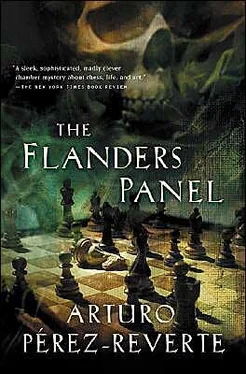“You’re lying, Cesar. Not you. Tell me you’re lying.”
“I’d love to, Princess. I assure you I’d like nothing better than to tell you that it’s all been a joke in the worst possible taste. But life is quite capable of playing such tricks on one.”
“How long have you known?”
Cesar brushed the question aside with a languid gesture of his hand, as if time had ceased to matter to him.
“Two months, more or less,” he said. “It began with the appearance of a small tumour in my rectum. Rather unpleasant.”
“You never said anything to me.”
“Why should I have? If you’ll forgive the indelicacy, my dear, I’ve always felt my rectum was strictly my business.”
“How much longer have you got?”
“Not much. Six or seven months, I think. And they say the weight simply falls off you.”
“They’ll send you to a hospital then. You won’t go to prison. Nor even to a lunatic asylum, as you put it.”
Cesar shook his head calmly.
“I won’t go to any of those places, my dear. Can you imagine anything more horrible when dying of something so vulgar? Oh, no. Definitely not. I refuse. I at least claim the right to give my exit a personal touch. It must be dreadful to take with you as your last image of this world an intravenous drip hanging over your head, with your visitors tripping over your oxygen tank.” He looked at the furniture, the tapestries and the paintings in the room. “I prefer to give myself a Florentine death, amongst all the objects that I love. A discreet, gentle exit is better suited to my tastes and my character.”
“When?”
“In a while. Whenever you two are kind enough to leave me alone.”
Munoz was waiting in the street, leaning against the wall with his raincoat collar turned up. He seemed absorbed in secret thoughts, and when Julia appeared at the door and came over to him, he didn’t at first look up.
“How’s he going to do it?” he asked.
“Prussic acid. He’s got a flask of it that he’s had for ages.” She smiled bitterly. “He says a bullet would be more heroic, but it would leave him with an unpleasantly surprised look on his face. He prefers to the looking his best.”
“I understand.”
“There’s a telephone box near here, around the corner.” She looked at Munoz absently. “He asked us to give him ten minutes before calling the police.”
They set off along the pavement side by side, beneath the yellow light of the street lamps. At the end of the deserted street, the traffic lights were changing from green to amber to red. The light illuminated Julia’s face, marking it with deep, fantastic shadows.
“What do you think you’ll do now?” asked Munoz. He spoke without looking at her, keeping his gaze fixed on the ground ahead of him. She shrugged.
“That depends on you.”
Then Julia heard Munoz laugh. It was a profound, gentle laugh, slightly nasal, that seemed to bubble up from deep inside him. For a fraction of a second, she had the impression that it was one of the characters in the painting, and not Munoz, who was laughing at her side.
“Your friend Cesar is right,” Munoz said. “I do need some new shirts.”
Julia ran her fingers over the three porcelain figurines – Octavio, Lucinda and Scaramouche – that she was carrying in her raincoat pocket, along with the sealed envelope. The cold night air dried her lips and froze the tears in her eyes.
“Did he say anything else before you left him alone?” asked Munoz.
“ ‘Nec sum adeo informis… I’m not so very ugly. I saw myself recently, reflected in the waters along the shore, when the sea was calm.”“ It was just like Cesar to quote Virgil when she turned at the door to take in at a glance the chiaroscuro drawing room, the dark tones of the old paintings on the walls, the faint gleam, filtered by the parchment lampshade, on the surface of the furniture, the yellowing ivory, the gold on the spines of the books. And Cesar standing against the light in the middle of the room, his features impossible to make out; a clear, slim silhouette like the effigy on a medal or an antique cameo, his shadow falling, almost brushing Julia’s feet, on the red and ochre arabesques of the carpet. And the chimes that sounded at the same instant she closed the door, as if it were the stone slab of a tomb. It was as if everything had been foreseen long before, and each of them had conscientiously performed the role assigned in the play that had finished on the chessboard at that exact hour, five centuries after the first act, with the mathematical precision of the black queen’s final move.
“No,” she murmured in a low voice, feeling the image moving slowly off, sinking into the depths of her memory. “No, he didn’t really say much else.”
Munoz looked up, like a thin, ungainly dog sniffing the dark sky above their heads, and he smiled with wry affection. “It’s a pity,” he said. “He’d have made an excellent chess player.”
The sound of her footsteps echoes in the empty cloister, beneath the vaulted roof already plunged in shadow. The final rays of the setting sun fall almost horizontally, filtered through the stone shutters, staining red the convent walls, the empty niches, the ivy leaves turned yellow by the autumn curling about the capitals of the columns, the monsters, warriors, saints, mythological beasts that support the grave, Gothic arches surrounding the garden invaded by weeds. The wind howls outside, warning of the cold northern weather that always precedes winter, whirling up the side of the hill, where it shakes the branches of the trees and draws from the gargoyles and the eaves of the roof the boom of centuries-old stone; it sets the bronze bells in the tower swaying and, above them, a creaking, rusty weathervane points obstinately south, a south that is perhaps luminous, distant and inaccessible.
The woman dressed in mourning stops by a mural eaten away by time and damp. Only a few fragments of the original colours remain: the blue of a tunic, the ochre outline of a figure; a hand cut off at the wrist, one index finger pointing up at a nonexistent sky, a Christ whose features meld into the crumbling plaster of the wall; a ray of sun or of divine light, with no origin or destination, suspended between heaven and earth, a segment of yellow light absurdly frozen in time and space, which the years and the weather have gradually worn away, until one day it will be extinguished or erased, as if it had never even been there. And an angel with no mouth and a frown like that of a judge or an executioner, of whom one can only make out, amongst what remains of the paint, a pair of wings stained with lime, a fragment of tunic and the vague shape of a sword.
The woman dressed in mourning lifts the black veils that cover her face and looks for a long time into the eyes of the angel. For eighteen years she has stopped here every day at the same hour and she sees the ravages of time gnawing away at what remains of that painting. She has watched it disappear little by little, as if afflicted by a leprosy that tears off lumps of flesh, that blurs the figure of the angel, so that it blends with the dirty plaster of the wall, with the damp that causes the colours to blister, that cracks and fragments the images. Where she lives there are no mirrors. They are forbidden by the order she entered, or that perhaps she was obliged to enter. Like the painting on the wall, her memory contains more and more blanks. She has not seen her own face for eighteen years, and for her that angel, who doubtless once possessed a beautiful face, is the only external reference to the effect of passing time on her own features: peeling paint instead of wrinkles, blurred outlines instead of ageing skin. In the occasional moments of lucidity that arrive like waves licking the sands of a beach, moments to which she clings, desperately trying to fix them in her confused, ghost-ridden memory, she seems to recall that she is fifty-four years old.
Читать дальше












